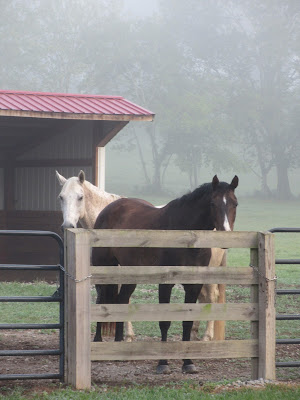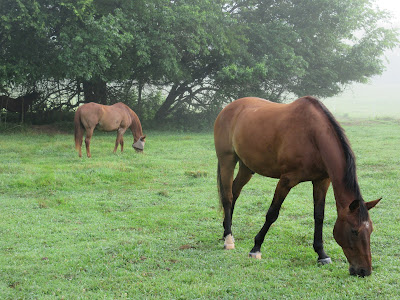We get asked all the time to provide free consulting on how to start a retirement farm. By all the time I mean we are contacted on average 2-3 times per week asking for advice, guidance, etc. on starting and/or running a retirement farm. While I genuinely wish we had time to assist and answer all these inquiries we simply do not have the time it takes to provide detailed answers. It is not because we don't want to be helpful, it is because we are way too busy running our own farm and attempting to occasionally carve out some non-working family time.
In the last few months it seems as if we have been contacted more than ever by people interested in running a retirement farm. Over the years we have essentially been asked some variation on the same core group of questions. Since we don't have time for anything but brief and basic correspondence with these inquiries I have tried to put helpful information on our website for people interested in running a retirement farm. However I thought I would expand a bit on the topic in this post.
1. What do you charge for board? I'm going to admit that this question always makes me shake my head, but I come from a business background. This is the WRONG question to be asking, yet is almost always the first question. What we charge for board should absolutely have nothing to do with whatever you charge for board. Why is this? The answer is in Business 101. You have to determine your costs for land, infrastructure, feed, hay, bedding, other supplies, labor, equipment, etc. and THEN decide what you need to be charging for board in order to make it a reasonable endeavor.
You may be able to charge less than we do, you might need to charge a lot more. It all depends on the costs that are specific to your geographical area, and it also depends on the types of facilities you have. Land proximate to New York City is going to cost a lot more than land in rural Arkansas Four board wood fencing is expensive, you might use a cheaper option. Or maybe you want to build the Taj Mahal of barns which will obviously drive your costs up. .
2. I want to earn extra income by boarding retired horses, what do you think? Or another variation on this common question is similar to "I own 15 acres and I will be retiring soon. I think boarding retired horses will be a great way to earn income, and at the same time I can enjoy taking care of and watching the horses. What do you think?" I think for most people asking this question it is probably a bad idea, especially given that most of the people who are asking this question have little to no experience with horses. You are going to end up being very tied to your property, which means your dreams of doing a lot of travel, visiting family more frequently, etc. are going to be hard to accomplish.
It is much easier to do these things with no horses at your house and a regular 8-5 job with sick, holiday and vacation time. The horses will need to be cared for 365 days per year, even on Christmas, even in the rain, the cold and the heat, even if you are sick with the flu (been there done that more than once), no matter who dies, even if your spouse is seriously ill or hurt and in the hospital . . . I could go on and on and on. The day after my father died I held horses for the farrier. I wanted to be with my mother and sister but taking care of living things, be it horses, people, etc. never stops.
Do not misunderstand, I love what I do and that should be pretty evident to anyone who reads this blog, but for some reason people seriously romanticize the realities of running a retirement farm. It is hard physical work, it is 24/7/365 (horses love to hurt themselves or get sick at the holidays, when you have plans, etc., trust me on this!!), you work outside no matter what the weather brings, you get dirty, the horses decide to be rude and uncooperative at the most inopportune times, and the same care has to be provided every day. That means weekdays, weekends, holidays, EVERY DAY someone has to be out there doing the work. This is not like a herd of cows where you can put them out in the pasture with hay and water that you check every few days and they pretty much look after themselves. You need to like being at home most of the time and you need to like being outside most of the time.
3. I already run a regular boarding facility but I want to change over to boarding retired horses. How do I do this? My answer to this will be short as this is a pretty straightforward question. I really only see two options. The first one is to gradually phase over your business by having all new boarders be retirees and slowly change the focus of your business. Option two is an immediate change and as of X date you now only board retirees. This means any current boarders that are not retirees will need to leave.
4. How do I start a retirement farm? This is an awfully broad question but the good news is this is not rocket science. Decide what type of care you want to provide and to how many horses, which in turn will determine the type of facilities and acreage you will need. Now calculate your costs: land, facilities & infrastructure, feed, hay, bedding, insurance, equipment, maintenance (fences, buildings, equipment and land will all need maintenance), labor, routine supplies, marketing/advertising, taxes, utility bills, etc. Once you know your costs you will know what you need to charge per horse to have a viable business.
5. We've been asked a variation of this question several times and it always surprises me. It goes something like this: I want to have a retirement farm and make a reasonable income, however I don't want to be tied to the farm. How can I do this? I never quite know where to start with this one. I'll answer a question with a question. If you don't like the idea of being tied to your farm why do you want to do this?
6. How do I attract and keep clients? As with most things getting started is the hardest part. Hopefully you have been involved with horses in some manner for awhile and thus have contacts and relationships in the horse world. Let these people know what you are doing, word of mouth is the most powerful advertising. Advertise in publications that go to your target audience, have a website, etc. Once you have boarders you need to do what you said you would do. I cannot emphasize that sentence enough. Provide the care you promised to provide, even when you are sick, even when you have a family emergency, etc.
Those are the answers to a few of our most frequently asked questions, I hope someone finds them helpful. There is nothing ground breaking in any of these answers but this is a pretty straightforward business model.
One thing I will add is when Jason and I were looking for land a few years ago, of all the "horsey" areas we looked at in the southeast (middle Tennessee, Lexington, Tryon, Aiken, etc.) Lexington, KY had the most affordable real estate by a landslide. We were blown away by the selling prices for turn-key horse farms. We seriously considered moving ourselves and all the horses there, it would have been considerably more affordable than staying in middle Tennessee. In the end Lexington gets way too much winter weather for me so we stayed in middle Tennessee, but it was a close call. So I guess my one last bit of advice is if you are looking for land or a turn-key horse farm in a horsey area, you cannot beat Lexington, KY for affordability.
________________________________
Gus, Cocomo and Asterik
Lofty and Romeo
Stormy, Walon, Johnny, Oskar and Donovan
Moe and Levendi
Apollo and Thomas
Walden and Duesy
Timbit and Griselle
O'Reilly and Merlin
morning view












5 comments:
You guys were nice enough to answer my main question about starting a retirement facility, which was "what do you do if someone doesn't pay the board?" You said it had never happened so far (knock on wood), and it hasn't to me either. Careful screening is important!
Between the blog, your website, and the times you HAVE taken time to respond to my specific questions, your experience has been extremely helpful in the development of EvenSong Farn Equine Retirement! And I always give you credit for inspiring us. Thanks! To both Melissa and Jason!
I started following your Blog off of CoTH when my mother came up with the idea that SHE wanted me to run a retirement facility on my property. The result? I told her no way, I found two good web(sic) friends, and I found a nice place I want to retire MY horse to. LOL!
Oh, just what SmartAlex said! People kept telling me to fill the empty stall in my barn with a retiree, and I was like "why is this a thing now?" -- not retirement farms, but everyone thinking they can do it? I saw your website, from CoTH, too, and thought "now THAT is how retirement board should look." Great post, thoughtful and honest and perfectly descriptive of what it's like to care for horses, 24/7. I hope you can point people to this and they absorb it fully.
All I can say is that I'm so glad that Apollo and I are with you. It is 9 years now and I don't have to worry about him and the care he is getting. Due to health reasons and personal circumstances, I have not been able to visit in several years but I know he is well. I miss him terribly but I see he looks great in the pictures and I trust you guys implicitly.
Post a Comment